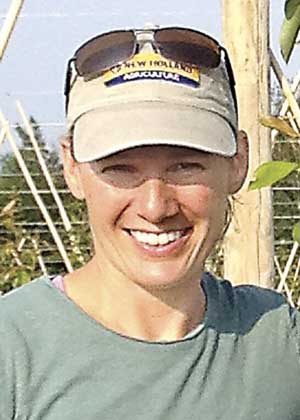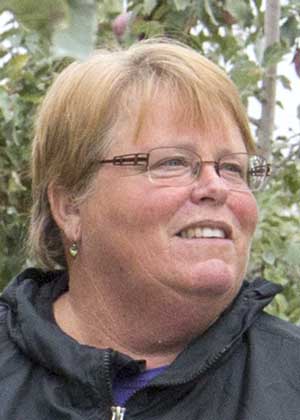
Lisa Jenereaux
When Lisa Jenereaux joined her family’s Nova Scotia farm 16 years ago, she didn’t know how to drive a tractor and had no formal experience in agriculture. Needless to say, it was a huge learning curve.
She relied on groups like the International Fruit Tree Association to push her out of her comfort zone and teach her the ins and outs of growing fruit, adopting new technologies and running a business.
Now 41, Jenereaux is an IFTA board member and, along with others in the group, aims to give something back to other women just joining the industry.
The inaugural IFTA Women’s Network gathering, to be held as part of the association’s annual conference in February, is not just for women.
Rather, it’s an opportunity to celebrate the contributions of women to the industry and to hear about the challenges and successes of some of the most recognized leaders in the industry.
Women in IFTA include nursery, extension and research professionals, farmers and representatives of industry-allied services.

Karen Lewis
They represent all of the diversity in the tree fruit industry, said Karen Lewis, an IFTA board member who also leads Washington State University’s Tree Fruit Extension team. And when you bring women together, they usually talk about two things, she said: leadership and balance.
Often, women complain that they get invited into the room, but nobody actually listens to them.
“That’s not our focus here. We want to talk about how we can do it better. We’ve been offered a place of leadership, we’ve accepted a place of leadership, and we want to optimize that opportunity,” she said. “Sometimes we need to look within our own group to discuss how we can do this better — and not better for just women, but better to serve the organization or industry.”
Younger women also are struggling to find balance. Everything is bigger and moves faster.
There are millions of new products, and government regulations continue to increase. And like women everywhere, women in the tree fruit industry want to be good at everything, including leadership, executing professional goals and successfully raising a family.
“By bringing women of different ages together, we can help one another. We can say, ‘This is how I made choices,’ or ‘You’re safe to make these choices in the first 10 years of your career,’” she said. “And a big one: What the value is in saying no.”
Jenereaux grew up on her family’s 800-acre farm in the Annapolis Valley, but when she became an adult, she wanted to get as far away from the farm as possible. She moved to Ontario, working in the travel and tourism industry for several years, before she and her husband returned to the farm for a summer.
It was supposed to be a temporary stop, while they waited for paperwork to clear to be able to work at a group home in Indiana for teens in trouble — what was to be their new passion. The paperwork never came through.
“Here we were, home, wondering what to do now,” she said. Then, the orchard manager left, and her father and uncle asked if she’d be interested in joining the farm. “As a kid, you get all the crappy jobs. That’s the reality of it. All you know about farming then is picking up brush, stamping bags — all the horrible jobs,” she said. “But the more they talked about it, the more I thought, ‘This sounds great.’”
Today, Jenereaux is among the fifth generation at Spurr Brothers farm, serving as its orchard manager. The 800-acre diversified farm includes about 100 acres in orchards. She sees numerous benefits to women — and men — hearing from women who’ve gained a foothold in the industry, and Lewis agrees.
“There’s no downside to bringing together a group of women from a diverse background for a night,” Lewis said. “It can’t fail.”
IFTA provides research, teaching and travel to advance knowledge and build a global community of tree fruit professionals through its annual conference and summer study tours. The 60th annual conference — the theme is
“From Bud to Bin” — includes two days of educational sessions and two days of field tours. The women’s network will meet Monday, Feb. 20, 6:30-8:30 p.m., in Wenatchee, Washington.
In addition to Jenereaux, the panel of speakers will include Dena Ybarra, owner of Columbia Basin Nursery, and Deborah Moore, vice president of the Washington Ag Forestry Leadership Program.
For more information and to register, visit ifruittree.org. •
– by Shannon Dininny, editor of Good Fruit Grower, will be a moderator at the women’s network event.






Leave A Comment